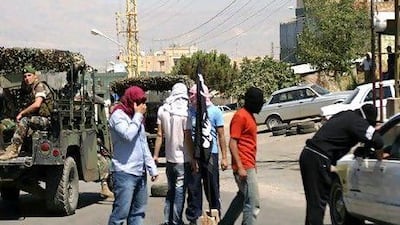The spate of kidnappings last week in Lebanon caused residents of the capital to pause and ask whether their fragile country had finally become a full-fledged theatre of the civil war raging next door in Syria.
There was a video broadcast on the satellite station Al Arabiya of a video purportedly showing members of the rebel Free Syrian Army speaking with a Lebanese citizen they had taken hostage.
Then, within 24 hours, there were militiamen aligned with the man's Shiite clan in Lebanon taking revenge and kidnapping a Turkish citizen and several Syrians it said were aligned with the opposition to Syrian President Bashar Al Assad.
The televised images, the claims of responsibility and the allegations of shadowy foreign involvement all conjured up memories that most Lebanese strive to forget.
Yet despite the worrying signs and the air of crisis that wafted through Beirut last week, most Lebanese were still confident that the violence was not a harbinger of the instability by which all other is measured here: the civil war between 1975 and 1990 that ravaged the country and left more than 150,000 people dead.
“We have become used to these low intensity clashes here and there. They have hit specific targets,” said Manal Mukkadam, a college student at the American University of Beirut. “Things are a little tense, but I do not think we are heading for a civil war.”
Nadim Shehadi, an associate fellow in the Middle East and North Africa programme at Chatham House in London, agrees.
“There is no fertile ground for civil war in Lebanon,” he said. “If the hay was dry in the barn, it would have flared up with one spark.”
Indeed, the crisis showed that for all the fissures still afflicting Lebanon’s political establishment, lessons about brinkmanship have been learnt.
The involvement of the Al Meqdad clan raised the dire prospect that the Shiite movement Hizbollah, which has so far struck a cautious balance between its alliance with the Assad regime in Damascus and its need to maintain its domestic political base in Lebanon, might finally move more aggressively into the fray. Instead, its secretary general Hassan Nasrallah denied that his group and Amal, another group associated with the Shiite community, had any link to the kidnappings.
“The idea that Hizbollah and Amal are controlling the situation on the ground is not accurate anymore,” Mr Nasrallah claimed on Friday.
Hizbollah and its allies hold a majority of seats in the government, which has so far refused to take a position on the Syrian crisis except to call for its peaceful resolution.
Complicity in the kidnappings by the Al Meqdad clan would have tipped Lebanon’s delicate political balance.
“You act responsibly when you feel your country is at the brink,” said Clovis Maksoud, the former Arab League ambassador to the United Nations and the United States and currently a political science professor at American University in Washington, DC. “The very parties who brought the country to the brink are now working to bring it back in the other direction.”
The kidnappings overshadowed the largest political scandal to hit Lebanon in recent years, when Michel Samaha, a pro-Syrian former government minister, was arrested by Lebanese security forces for allegedly transporting bombs from Syria and planning to set them off in Lebanon to incite sectarian warfare. Lebanon’s military prosecutor also accused Ali Mamlouk, the head of Syrian intelligence, for his role in the plot.
The reactions of Lebanon’s leading political players were telling.
President Michel Suleiman said he expected a phone call from Mr Al Assad to explain the incident, Hizbollah refrained from rushing to Syria’s defence and Druze leader Walid Jumblatt urged foreign powers to arm Syrian rebels more quickly in order to accelerate the Syrian regime’s downfall and spare the country partition.
Those reactions were a far cry from the days when Damascus was the main power broker in Lebanon and Beirut held it in thrall.
“Lebanon has just realised a drastic level of interference that could have ignited a type of civil conflict. Fortunately, it was scuttled. Lebanon has achieved a level of immunity to such interference,” Mr Maksoud said. For many Lebanese, the Samaha case confirmed suspicions that the Syrian regime was seeking to destabilise their country to save his own skin.
“Bashar Al Assad’s strategy, not only in Lebanon but in the whole region, was to create problems only he could resolve,” Mr Shehadi said.
“In every interview, Al Assad says if you destabilise Syria, you will destabilise the whole region and ignite sectarian conflict. He makes it a self-fulfilling prophecy.”
Mr Maksoud said the Syrian president is proving unable to come to grips with the changes that are under way in his country and those that have already occurred in Lebanon. "At this moment, he would do anything to buy time to sustain his regime and prepare the ground for alternate scenarios."
foreign.desk@thenational.ae

